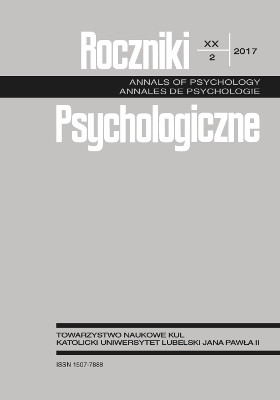Specificity of dysfunctional beliefs in personality disorders: Psychometric characteristics of the Polish translation and modified version of the Personality Beliefs Questionnaire (PBQ)
Specificity of dysfunctional beliefs in personality disorders: Psychometric characteristics of the Polish translation and modified version of the Personality Beliefs Questionnaire (PBQ)
Author(s): Bogdan Zawadzki, Agnieszka Popiel, Ewa Pragłowska , Cory NewmanSubject(s): Social Sciences, Psychology, Clinical psychology
Published by: Towarzystwo Naukowe KUL & Katolicki Uniwersytet Lubelski Jana Pawła II
Keywords: core beliefs; Personality Beliefs Questionnaire (PBQ); personality disorders; diagnosis; convergent and discriminant validity
Summary/Abstract: The present analyses focused on the adaptation of the Personality Beliefs Questionnaire (PBQ) – a tool measuring beliefs specific to personality disorders. Two Polish versions of the PBQ were developed: a translation of the original version consisting of 126 items, and a modified version comprised of 124 items (the scale for borderline personality was made diagnostically independent; the scale for schizotypal personality was added, and the items were assigned to the scales not only on the basis of their content but also on the basis of factor analysis results). For both versions, indicators of measurement reliability and validity were obtained based on results from more than 1,600 subjects. The data showed that the scales of both versions demonstrated acceptable reliability in terms of both internal consistency and temporal stability. The values of convergent validity of the scales in both versions were comparable (correlations with scales of the SCID-II questionnaire for Structured Clinical Interview for DSM-IV Axis II and TALEIA-400A: Test for AxiaL Evaluation and Interview for Clinical, Personnel, and Guidance Applications, assessing personality disorders), but scales of the modified PBQ version showed better discriminant validity (its internal structure also was very clearly confirmed by the results of confirmatory factor analysis). Insufficiently high convergent validity was found for both PBQ versions, including high intercorrelations among scales. Therefore, the discussion emphasized that although the PBQ allows for the identification of specific beliefs in personality disorders, it is not a diagnostic equivalent for tools assessing disorders per se.
Journal: Roczniki Psychologiczne
- Issue Year: 20/2017
- Issue No: 2
- Page Range: 355-372
- Page Count: 18
- Language: English

